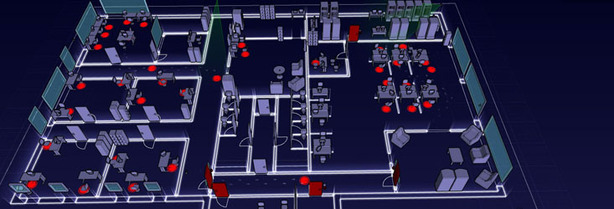Introversion Interview: Big in Britain
April 6, 2010 | 08:26
Companies: #defcon #indie #introversion #introversion-software

Introversion Interview
There was a golden age for the UK games industry when there were plenty of established developers and published headquartered within the country, but increasingly the big teams are finding themselves part of multi-national conglomerates. It’s something we’ve been reflecting on a lot as part of our Made In The UK week.That said, there’s still plenty of invention and creativity to be found within ol’ Blighty’s borders – it’s just that it’s more commonly found in smaller, publisher-independent developers who tend to focus on creating truly original games that appeal to those with a taste for the unique.
Turning those ideas into a sustainable business model and actually creating a lasting impact on the industry beyond the spate of fleetingly fashionable games is no mean feat though. To get a better understanding of the issues affecting indie developers in the UK and elsewhere, we chatted to Mark Morris of English independent Introversion, who told us a little about their recently announced new game, Subversion, too.
Bit-tech: Hi! Just for our readers who’ve been hiding under a rock for the past few years, can you tell us how Introversion was first founded and how the core team came together, made it big and became gaming superstars?
Mark Morris: Well, it all began back in 1997 when four of us met at Imperial College in London. After four years of gruelling study we were about to be released back into the community, when we saw that there was a competition to win £10k for the best written business plan. Chris had been working on Uplink, our first game, in his spare time and we decided that we would write a plan involving us burning our own CDs printing labels and taking credit card orders over the web.
We submitted the plan, got an “F-“, but did it anyway. We sold more copies than we could have hoped, brokered a UK retail deal followed by an ill-fated US deal and we just went from strength to strength. Darwinia, DEFCON and Multiwinia all followed and eventually we were able to sit back and relax, safe in the knowledge that we were gaming superstars.
If only that last part was true.
BT: Introversion is often compared to the ‘bedroom coders’ that once made up much of the UK’s gaming industry. What do you think of these comparisons? Do you like being a smaller, independent team or are you just itching for a big conglomerate to make you an offer?
MM: When we started our tag line was “The last of the bedroom coders” in direct homage to those legends of the industry that were doing all that fantastic stuff back in the 80s and 90s. We have no problem being compared to those small teams and in many regards are working practises are pretty similar – we have an office, but most people work from home. Ultimately we want to make creative games and that’s how we’d rather be judged.
Growth is a bit of a divisive issue, personally I’d like to take us forward, grow the team and increase the number of games that we can produce, but other members of the team are happy working in a relaxed environment working on games that they love – if someone did offer to buy us, a lot of the discussion would be about what would we do afterwards? Never say never, but I’m not sure anyone would want to take a punt on us – we’re a bit too headstrong and independent to be tamed!
BT: We’ve been talking a lot this week about the state of the UK’s games industry, but what’s your opinion on the UK and how it compares to the rest of the market?
MM: The UK industry does seem to like to whinge about the state of the UK industry and there are valid points about other countries offering tax breaks or other incentives, but fundamentally I see quite a vibrant community still. There are quite a few indie companies making new and innovative games – Beatnic, Airplay, Tuna etc – the list goes on. It’s a difficult time for all businesses, but I think we are doing okay.

MSI MPG Velox 100R Chassis Review
October 14 2021 | 15:04











Want to comment? Please log in.